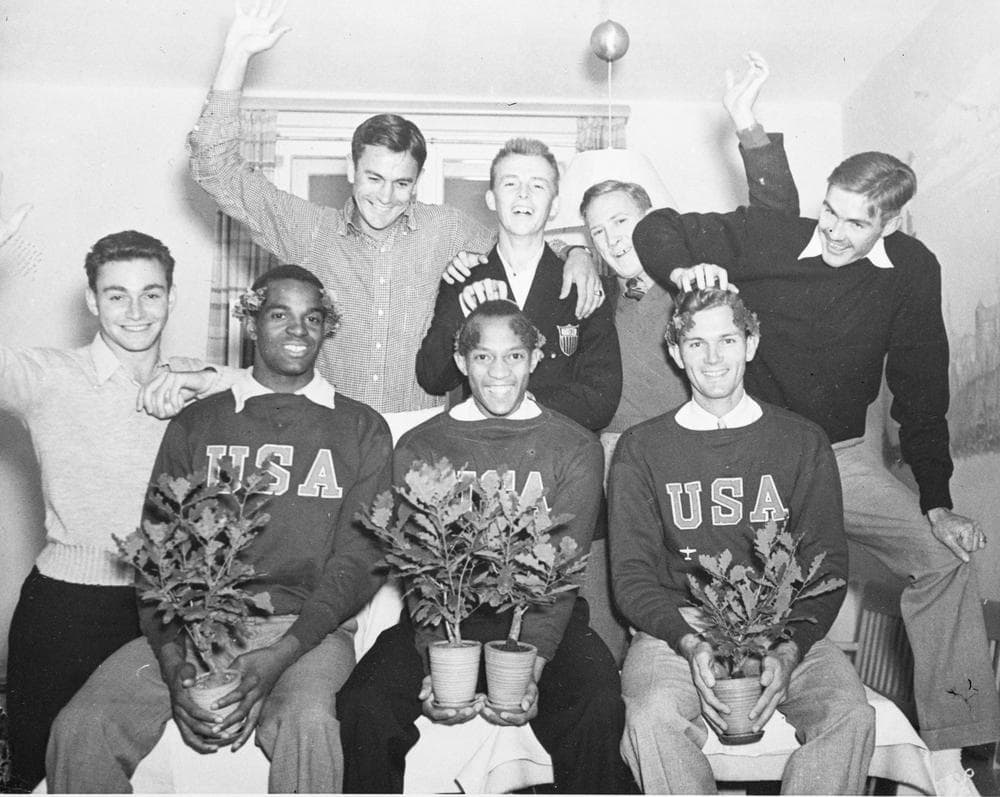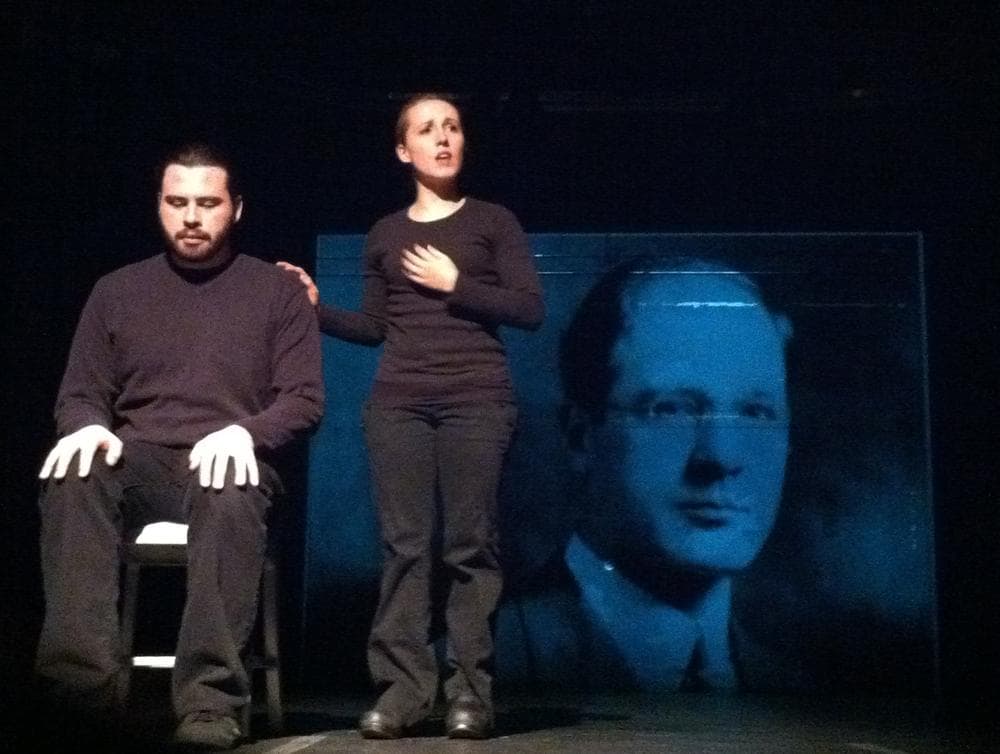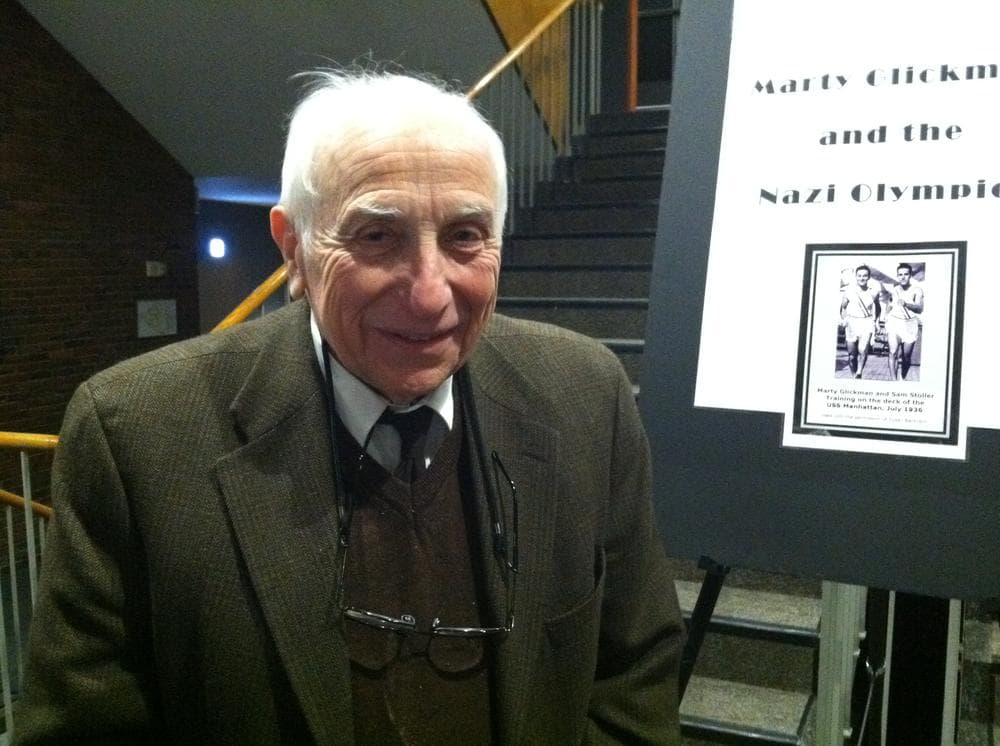Advertisement
An Olympic Snub Reconsidered

Olympics Über Alles tests the audience early. In the opening minutes of a production staged at MIT's Kresge Little Theater, the role of Hitler is played by a black woman.
Nothing about this play came easy for Northeastern professor Samuel J. Bernstein and his co-writer, Margarite Krupp. The pair wrestled with the research and script, working twice a week for two hours at a time for two years.
"We read letters of people," said Bernstein. "We read about Hitler and his reaction. We read about the treatment of Jewish people who were athletes, both inside and outside of Germany."
Bernstein's goal was to explore the account of Marty Glickman and Sam Stoller, two Jewish-American sprinters who had been slated to run in the 4x100 meter relay at the 1936 Berlin Olympics. They were replaced at the last minute by Jesse Owens and fellow African American Ralph Metcalfe. Glickman, just 19 years old in 1936, came to believe the snub was a clear case of anti-Semitism. Playwright Sam Bernstein felt the incident said more than that.
"We tried to use the story of the boys as a way of keeping an interesting account before the people, because this is historical, but at the same time that we're doing that to explore more serious issues that inform what happened to the boys, lie behind what happened to the boys, and extend quite meaningfully into the very heart of the horrors of The Holocaust."

Using just eight actors to represent about 150 characters, Olympics Über Alles begins at the US Olympic trials on Randall's Island, New York. They play explores efforts to boycott the games, the passage of the Nuremburg Laws in Germany, and discrimination against the Jews dating back to before the birth of Christ. Eventually, the presentation finds itself at a meeting of athletes and coaches on the morning of the 4x100 Olympic relay. Jesse Owens and Ralph Metcalfe, played by female members of the ensemble cast, object to being substituted for Marty Glickman and Sam Stoller.
"Coach, let Sam and Marty run. They deserve it. I've already won three gold medals. I'm tired."
The belief that Glickman and Stoller were excluded on the basis of their religion is the crux of Olympics Über Alles, but even the playwright cannot say with certainty that it's valid. Susan Bachrach, curator of Special Exhibitions at the United States Holocaust Memorial Museum in Washington DC, suggested that there are as many explanations for what happened that day as there are pages in Bernstein's script.
Advertisement
"Some people even said after the fact that Owens had been lobbying to be put on the relay team and wanted to go for a fourth medal," she said.
Bachrach curated a special exhibit on the 1936 Olympics for the Holocaust Museum with help from the late Marty Glickman, who is best known for being the voice of the New York Knicks and the New York Giants from the late 1940s to the early 1970s. Bachrach remembers Glickman as "a very sweet man" but said his claims were not convincing.
"I think Glickman sincerely believed it," she said. "I'm not trying to say he didn't, but of course so much had to do with memory and what you remembered years later."
"Injustice was done. There's no doubt about that," said Professor Allen Guttman, who teaches at Amherst College and has written 11 books on sports history.
"It wasn't racism," he said, "because let's face it, they were replaced by two black runners. If racism had been the basic motive, nobody would have replaced two Jews with two African-Americans."

Most sports historians believe that Dean Cromwell, who was also the coach at USC, passed over Glickman and Stoller so that two USC runners would win medals. It's a theory that Playwright Sam Bernstein considers, but does not embrace, in his play.
Regardless of the cause of the snub, most remember the 1936 Games as the Nazi Olympics, a time when politics intruded on sport as it hadn't since Baron Pierre de Coubertin brought the modern games to life in 1896. Professor Guttman says that's not exactly accurate.
"Pierre De Coubertin meant the Olympics to be political," he said. "He wanted them to be a statement about the international reconciliation, about the way that people could come together and compete peacefully rather than through wars. What happened in 1936 and after is that a different kind of politics intruded on the games. That's not what Coubertin had in mind."
This segment aired on February 18, 2012.
